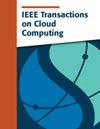区块链赋能联合学习的上下文感知共识算法
IF 5.3
2区 计算机科学
Q1 COMPUTER SCIENCE, INFORMATION SYSTEMS
引用次数: 0
摘要
在云计算的支持下,联邦学习(Federated Learning,FL)作为一种有前途的技术,在不共享本地数据的情况下激励客户协作训练模型,取得了快速发展。为了提高联邦学习实施的安全性和公平性,许多区块链赋能的联邦学习(BFL)框架应运而生。其中,共识算法在决定 BFL 系统的可扩展性、安全性和一致性方面发挥着举足轻重的作用。现有的区块生产者选择和奖励分配共识解决方案要么专注于资源充足的场景,要么基于客户对模型训练的贡献来适应 BFL。然而,这些方法由于涉及复杂的共识过程、在区块链共识过程中忽略客户贡献以及未能解决懒惰客户问题(恶意客户剽窃他人的本地模型更新以获取奖励),限制了共识效率并破坏了奖励公平性。鉴于上述挑战,我们首次尝试为具有懒客户端的异构 BFL 系统设计一种高效共识和公平奖励分配的联合解决方案。具体来说,我们引入了一种可通用的 BFL 工作流,它能很好地解决懒客户端问题。在此基础上,我们将 BFL 客户端的全局贡献分解为五个主要指标,并将区块生产者选择问题表述为奖励约束贡献最大化问题。通过解决这个问题,就能确定全局贡献最大化的最优区块生产者,从而协调共识流程,并根据客户各自的全局贡献按比例向其分配奖励。为实现这一目标,我们开发了一种名为 CPoC 的上下文感知贡献证明共识算法,以同时达成共识和激励,并对懒客户端问题和隐私问题进行了理论分析。在广泛使用的数据集上取得的经验结果证明了我们的设计在提高共识效率和最大化全局贡献方面的有效性。本文章由计算机程序翻译,如有差异,请以英文原文为准。
Context-Aware Consensus Algorithm for Blockchain-Empowered Federated Learning
Supported by cloud computing,
F
ederated
L
earning (FL) has experienced rapid advancement, as a promising technique to motivate clients to collaboratively train models without sharing local data. To improve the security and fairness of FL implementation, numerous
B
lockchain-empowered
F
ederated
L
earning (BFL) frameworks have emerged accordingly. Among them, consensus algorithms play a pivotal role in determining the scalability, security, and consistency of BFL systems. Existing consensus solutions to block producer selection and reward allocation either focus on well-resourced scenarios or accommodate BFL based on clients’ contributions to model training. However, these approaches limit consensus efficiency and undermine reward fairness, due to involving intricate consensus processes, disregarding clients’ contributions during blockchain consensus, and failing to address lazy client problems (malicious clients plagiarizing local model updates from others to reap rewards). Given the aforementioned challenges, we make the first attempt to design a joint solution for efficient consensus and fair reward allocation in heterogeneous BFL systems with lazy clients. Specifically, we introduce a generalizable BFL workflow that can address lazy client problems well. Based on it, the global contribution of BFL clients is decoupled into five dominant metrics, and the block producer selection problem is formulated as a reward-constraint contribution maximization problem. By addressing this problem, the optimal block producer that maximizes global contribution can be identified to orchestrate consensus processes, and rewards are distributed to clients in proportion to their respective global contributions. To achieve it, we develop a
C
ontext-aware
P
roof-
o
f-
C
ontribution consensus algorithm named CPoC to reach consensus and incentive simultaneously, followed by theoretical analysis of lazy client problems and privacy issues. Empirical results on widely-used datasets demonstrate the effectiveness of our design in improving consensus efficiency and maximizing global contribution.
求助全文
通过发布文献求助,成功后即可免费获取论文全文。
去求助
来源期刊

IEEE Transactions on Cloud Computing
Computer Science-Software
CiteScore
9.40
自引率
6.20%
发文量
167
期刊介绍:
The IEEE Transactions on Cloud Computing (TCC) is dedicated to the multidisciplinary field of cloud computing. It is committed to the publication of articles that present innovative research ideas, application results, and case studies in cloud computing, focusing on key technical issues related to theory, algorithms, systems, applications, and performance.
 求助内容:
求助内容: 应助结果提醒方式:
应助结果提醒方式:


